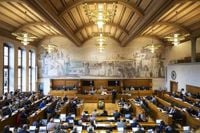The SPD faction in Lübeck is sounding alarms over what they describe as a blockade by the Jamaika coalition, consisting of the CDU, Greens, and FDP, regarding crucial data protection issues. This situation has arisen as the city administration has been attempting to lift a budget freeze that has hindered the creation of a new data protection officer position, which is deemed essential for safeguarding sensitive information.
For months, the SPD has been urging the coalition to release the necessary funds, but their requests have been met with continuous delays and inquiries from the coalition members. Frank Zahn, a member of the SPD faction, expressed frustration, stating, "We have over 4,000 dedicated employees in the Lübeck administration. Of those, 3,000 are IT positions, and they are blocking a single personnel position that deals with data security in this city. This is simply incomprehensible."
The urgency of the matter has escalated, as the data protection department is currently left without staff due to overwhelming workloads, with only the office being manned while all technical work has come to a halt. Mayor Jan Lindenau has already alerted the state data protection officer about this precarious situation. Additionally, Kai Neumann, the chairman of the overall staff council, made an appeal to the main committee members, attending the meeting in person, but his efforts were in vain.
Renate Prüß, another SPD member, expressed her outrage at the apparent disregard for data security by parts of the coalition, saying, "A completely wrong signal is being sent to the city employees. That data security is apparently so undervalued by parts of the coalition is absolutely irresponsible. Protecting the data of Lübeck's citizens is a central democratic task."
Furthermore, the SPD faction was taken aback by comments made by FDP faction leader Thorsten Fürter, who indicated that a discussion about a deputy position was ongoing and that his faction was advocating for a "weight loss injection" for the Lübeck administration. This remark raised eyebrows within the SPD, with Frank Zahn asserting that the issue at hand is not about substantive questions but rather political power plays at the expense of both the administration and the citizens.
In a time when artificial intelligence is becoming increasingly prevalent, alongside the introduction of digital citizen files and growing cyber threats, the call for enhanced data protection has never been more critical. Zahn emphasized the implications of the ongoing political maneuvering on potential job applicants, stating, "If the remaining employees in a department leave due to overload and there is no political will to signal improvement, then no new professionals will apply in the future. This is a devastating signal."
The SPD faction is urging the coalition parties—CDU, Greens, and FDP—to finally take responsibility and approve the release of funds for a capable administration, ensuring the protection of sensitive data and restoring citizens' trust.
In a separate yet related matter, the article highlights how data protection regulations are impacting charitable contributions in Weiding, where Dr. Erwin Aumer, a local philanthropist, donates thousands of euros annually to good causes. However, a court dispute in November 2024 raised questions about what constitutes a social purpose, underscoring the complexities surrounding data protection laws.
Meanwhile, the Commission for State Policy and Foreign Relations (SAK) has pre-advised the cantonal data protection law (KDSG) for its first reading in the Grand Council. The SAK is confident that a well-developed draft is in place and proposes only minor changes. The KDSG, which dates back to 1986, requires a total revision to align with federal legislation and European law, according to the SAK.
Among the proposed changes are expansions to the information and reporting obligations of authorities and clearer definitions of the rights of affected individuals. The government council's draft aims to reduce the burden on authorities by limiting the register of data protection collections, while also adding genetic and biometric data to the list of particularly sensitive personal information.
Moreover, the KDSG will shift from using the term "supervisory authorities" to "data protection authorities" to clarify that these bodies are primarily intended to advise, guide, and educate rather than to control and sanction. The data protection officer will be elected by a finding commission comprising members from both the executive and legislative branches, with the SAK recommending that the Justice Commission (JuKo) chair this commission instead of the Business Audit Commission (GPK).
Additionally, the SAK is advocating for the inclusion of a new article on the obligation to provide information in cases of automated individual decisions in the law, aligning it with federal data protection legislation. The Grand Council is expected to discuss the law in its first reading during the summer session of 2025.
As these developments unfold, the intersection of data protection and public policy continues to spark debate among local leaders and citizens alike. The SPD's call for action reflects broader concerns about the implications of data security on governance and public trust in an era of rapid technological advancement.





